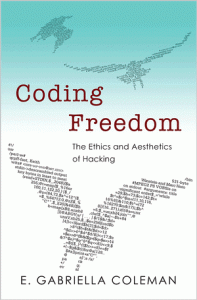Recommended reading.
An anthropologist explains how hackers are changing the definition of freedom

Coding Freedom: The Ethics and Aesthetics of Hacking, by E. Gabriella Coleman, dives into the ocean of software hacking: its culture, personalities, and craft. But it's also a legal history of hacking (modifying code) and cracking (illegally modifying code). Working an anthropologist, she haunted cons, chat rooms, and dug into the Linux kernel to unearth nuggets of insight. Though occasionally she uses academic jargon, her book is an intriguing read and connects the dots. What emerges is a picture of the “craft and craftiness” of hackers, how the free/open source movement came into being, and the battles being fought over digital rights in courtrooms, on street cams, and in government offices every day.
Phi Beta Iota: The “Administrative State” is a form of velvet tyranny that strives to micro-manage everything so as to coerce tolls from the wealthy while sacrificing the rights of citizens. Hacking is both a form of pushing the envelope and demonstrating the right stuff, and a form of civil disobedience in the face of great evil, the corruption of laws to the point that they have no moral standing.
See Also:
PBS: Are Hackers Outlaws or Watchdogs?
THE OPEN SOURCE EVERYTHING MANIFESTO: Transparency, Truth, & Trust



